.jpg)
Score breakdown
Things we like
- Driveability
- Loads of equipment
- Slender looks
- Big boot
Not so much
- Busy ride over uneven surfaces
- Fuel consumption
What is the Ford Escape Vignale AWD?
This is the fancy top-spec variant of the Ford Escape medium SUV that for just shy of $50,000 comes with almost everything Ford has to offer.
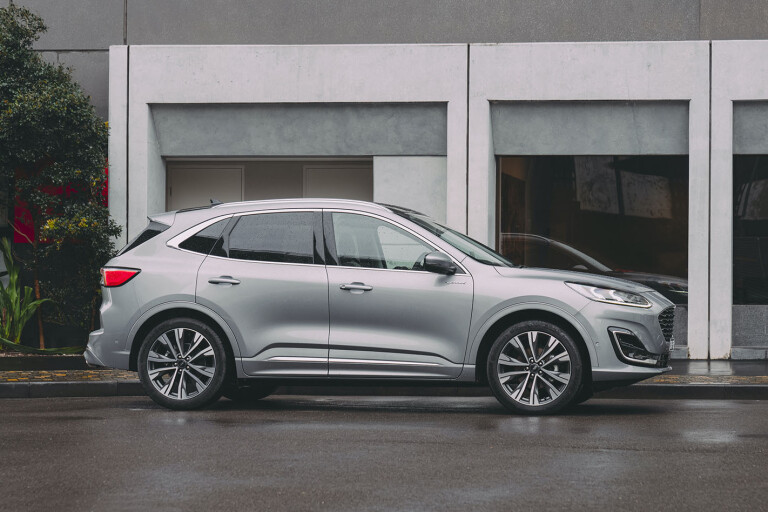
Pronounced Vin-yaleh, the Vignale is a direct rival to the Mazda CX-5 Akera Turbo in terms of trappings and performance, bringing a very lively 2.0-litre Ecoboost engine to the table.
While it looks small, it’s actually a little bigger than the previous model, with interior space benefitting from a 20mm longer wheelbase and sleeker interior fit-out resulting in more space and comfort.
What is the Ford Escape Vignale AWD like to live with?
The Ford Escape stands out for anyone who wants extra space and comfort over a lively hatchback without necessarily missing out on the fun driving experience.
In range-topping Vignale AWD trim it brings plenty of extra tech and creature comforts to retail for $49,590, which is $3000 more than front-wheel-drive (FWD) Vignale, while the entry-level Escape FWD costs $35,990 and the ST-Line AWD $40,990.
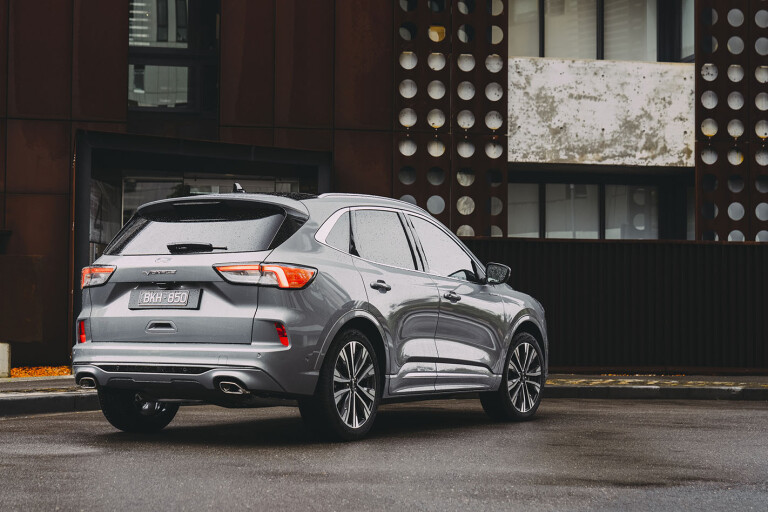
The Viglane's extras over the Escape’s already generous standard features list include advanced keyless entry, heated leather-wrapped steering wheel, leather-accented seats, 10-way power-adjustable front seats, heated front and rear outboard seats, panoramic sunroof, head-up display, hands-free power tailgate, 180-degree rear-view camera, 19-inch alloy wheels, advanced automated park assist, 10-speaker premium audio system, chrome exterior embellishments and LED quad-projector headlights.
Interior design of the Escape is virtually identical to the Ford Focus and the clutter-free dashboard seems a couple of generations newer than the previous model's bulky fascia that prematurely dated what was quite a good SUV.
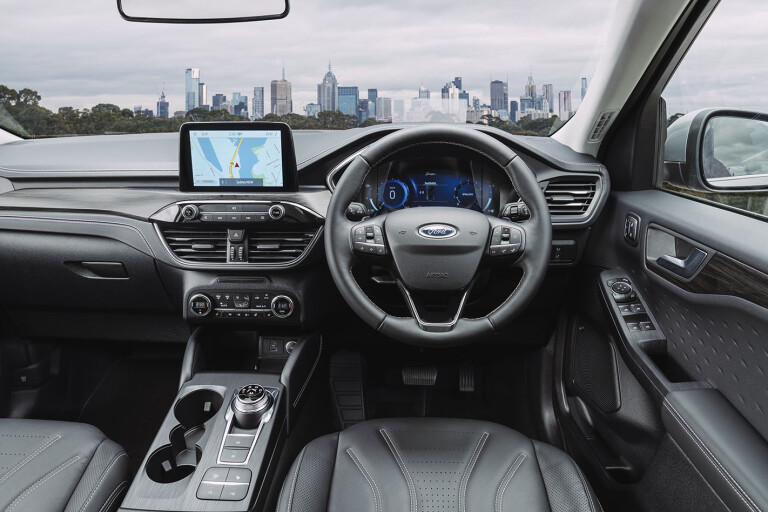
That said it is a little bland, though the Vignale brings some additional trim features such as faux polished timber and patterned door-card trim to provide a little visual interest and the panoramic sunroof brightens things up.
The centre console is well designed, the rotary gear shifter and electronic parking brake freeing up plenty of space. There is a deep bin with a padded lid/centre armrest a roomy spot up the front to plug in your phone or place it on the wireless charger and, of course, a couple of cup holders.
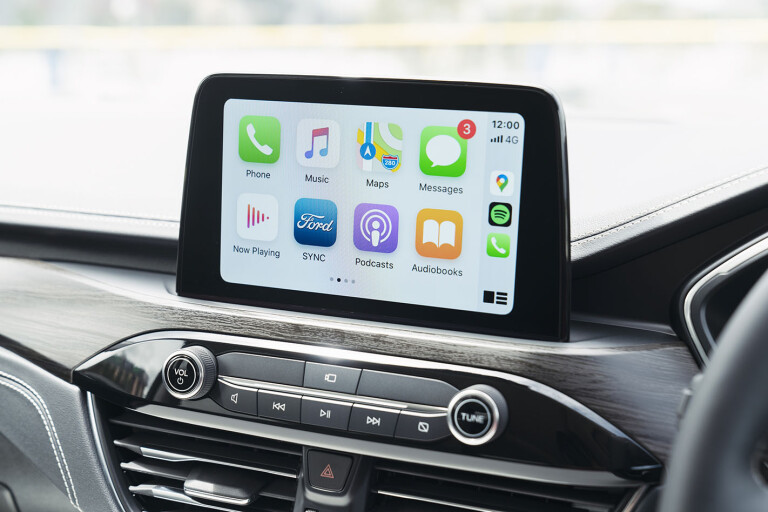
A floating 8.0-inch touchscreen sits above the dashboard line and displays Ford’s Sync3 infotainment system with Apple CarPlay/Android Auto, digital radio and in-built satellite navigation. Audio quality through the 10-speaker Bang & Olufsen sound system is excellent and had me driving around the block on a couple of occasions to hear out the end of a song.
The Vignale also has an attractive 12.3-inch digital gauge cluster that changes colour with the different driving modes and is complemented by a head-up display.
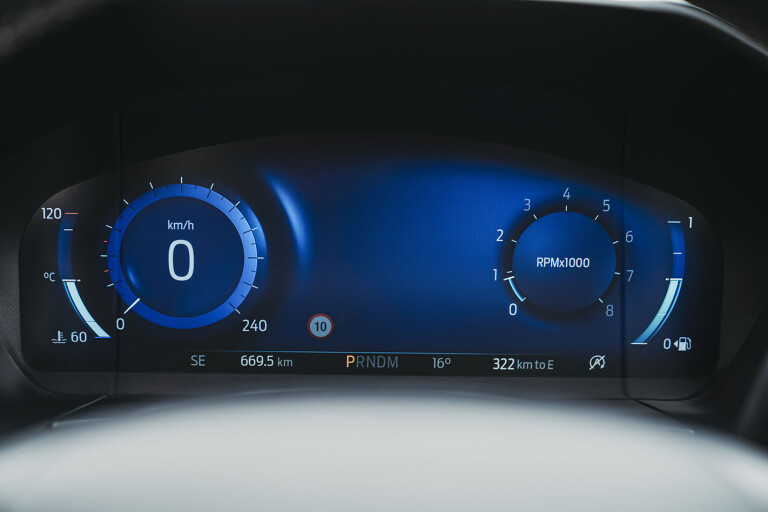
Driver display, audio and adaptive cruise control functions are easily controlled via buttons in the leather-wrapped steering wheel that feels nice in hand. Curiously the indicator/light stalk is on the left-hand side of the tiller, not on the right like most Fords, including the entry-level Escape.
Like the previous model, the driver’s seat is comfortable and offers a good upright driving position and excellent front vision, which many people are looking for in an SUV.
The front passenger seat has manual settings, but the backrest has a dial adjustment to get the positioning just right and there’s lumbar support.
Down back, the rear seats fit two adults comfortably and you’ll have no trouble fitting three children.
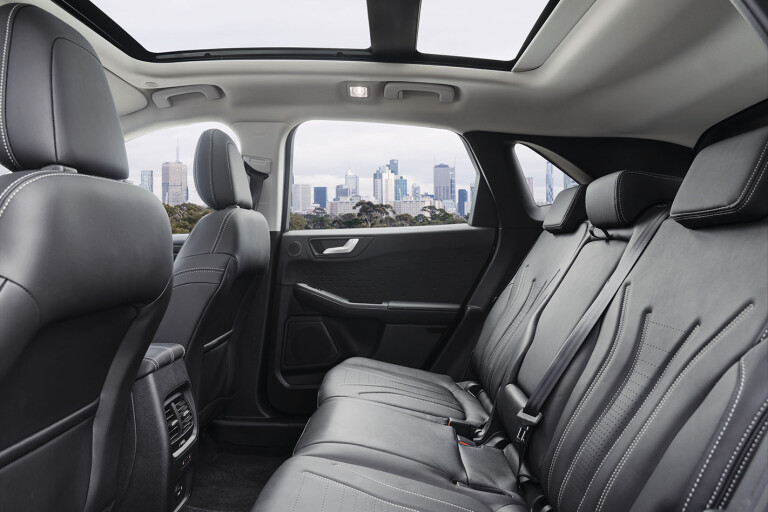
If you have smaller children there are two ISOFIX anchors and three top tether points.
The rear seats are slightly raised, affording good frontal vision and the window-line is low enough so smaller kids can see out.
There is plenty of legroom and plenty of space under the front seats to put your feet. The plush floor mats are a nice touch, as are the sculpted front seatbacks that bring additional knee room. The second-row backrests can recline a little and slide back and forth and there’s a pull-down centre armrest with cup holders.

As well as the outboard heated seats, rear passengers also get air vents, USB and USB-C sockets, and small door bins to put stuff including a cup or bottle.
The Escape has a big 526-litre boot and you can carry up 1426 litres with the 60:40 split rear seatbacks lowered using quick-release levers. There’s a 12-volt socket in the boot to run a car fridge or other appliances and you’ll find a space-saver spare wheel under the floor.
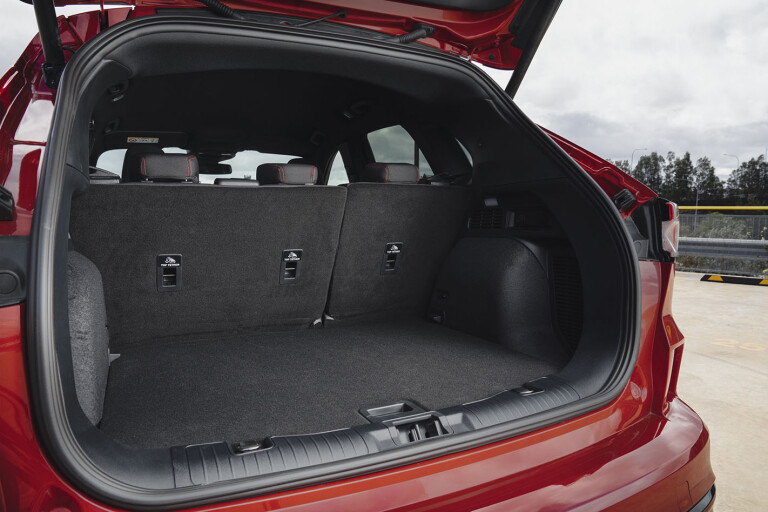
If you need to carry more the Escape has a maximum braked towing capacity of 1800kg and 750kg unbraked.
With official combined fuel economy of 8.6L/100km, the Escape’s punchy 2.0-litre turbo is a little on the thirsty side.
Service intervals are 12 months or 15,000km and when done through a Ford service centre cost just $305 during four of the first five visits but the fourth, at 60,000km, is a major service that will set you back $525. Another advantage of having your Escape serviced at a Ford dealer is you get a free loan car.
All Escape versions also come with the new FordPass Connect embedded modem system that brings remote vehicle functionality and connected services such as remote vehicle lock and unlock, key vehicle information and the ability to schedule your next service, all from a dedicated phone app.
The Ford Escape is covered by a five-year, unlimited-kilometre warranty.
What is the Ford Escape Vignale AWD like to drive?
The previous model Ford Escape – known as the Kuga in pre-facelift form – was one of the better mid-sized SUVs when it came to driving dynamics, so much so that it always did well in the Wheels SUV mega-tests right up to the end of its lifecycle.
So this new Escape has quite a bit to live up to, and doesn’t disappoint. It’s certainly quicker than the old model, delivering brisk off-the-line acceleration from the 187kW/387Nm 2.0-litre four-cylinder turbocharged petrol engine that’s coupled with an eight-speed automatic transmission.
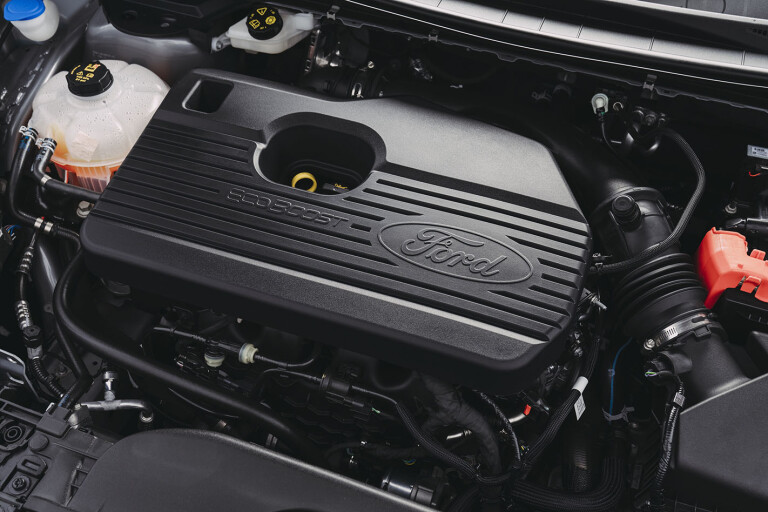
In the Sport driving mode, it spools up the revs before upshifting and is almost EV-like in its acceleration. There’s actually too much torque for the FWD drive versions, which are subject to a bit of chirping on take-off particularly if there has been a spot of rain.
The AWD contains it well to the point where the oomph in this thing is rather impressive. And it doesn’t run out of puff once you get speed, with plenty in reserve for overtaking. So, while it might be tempting to save $3000 and opt for the Vignale FWD, don’t – you won't think you'll need AWD until you do.
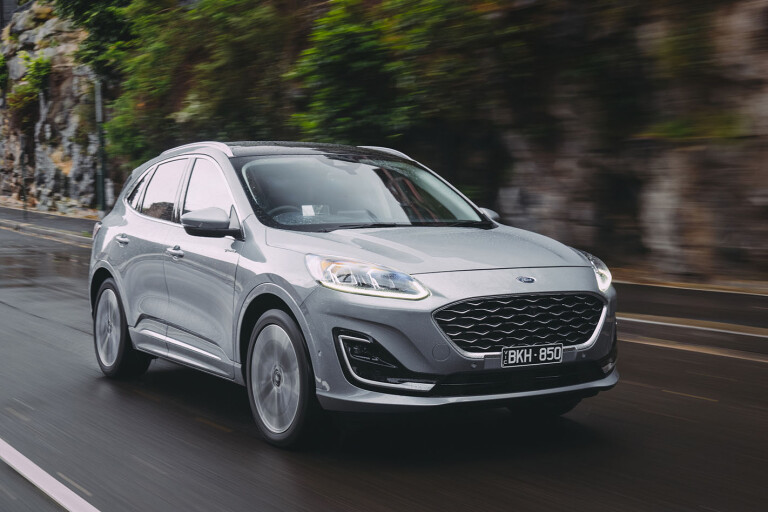
It rides on the same C2 platform as the Ford Focus and seems to think it’s a hatchback with direct and responsive steering, sharp handling and excellent body control.
The suspension, which consists of struts at the front and independent arms at the rear, offers a good balance between handling and ride comfort, but can get a little busy on uneven surfaces; unlike the older model that absorbed such surfaces particularly well.
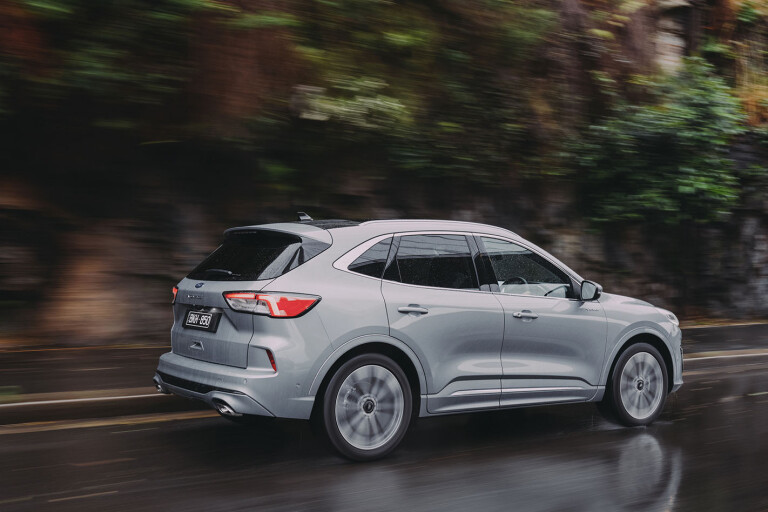
With AWD the Escape is noticeably better planted to the road than the front-drivers and makes better use of the five selectable drive modes – Normal, Eco, Sport, Slippery, Deep snow/sand and Trail – that alter the engine’s rev mapping and traction control accordingly. I didn’t get to test all its settings but it always felt grippy on wet roads and on gravel, with consistently good traction over looser surfaces and corrugations.
The Escape retains the fun factor around town, where it’s nimble and small enough so parking is never a chore. It has good all-round vision and a 180-degree parking camera and, just in case you find a particularly tight spot, there is an automated park assist that still amazes me no matter how many times I use it.
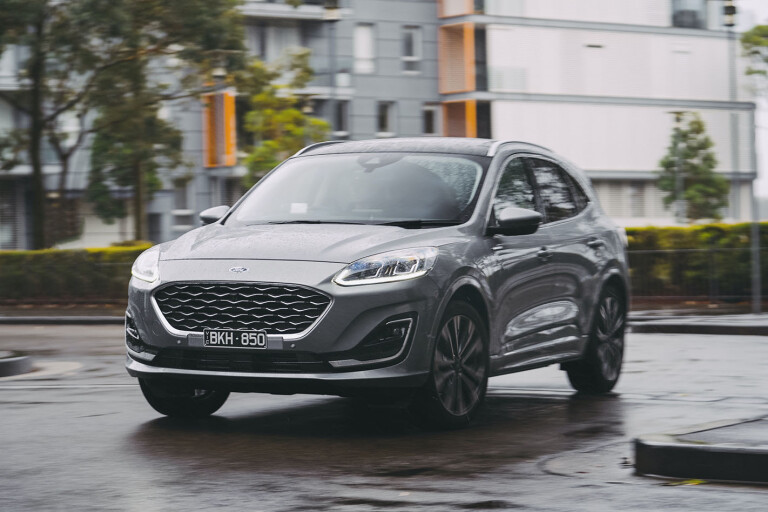
Unlike some park assist systems that can be quite confusing to operate, this latest version is quite simple – once it detects an appropriate spot you put turn the gear shifter to neutral and hold the Auto Park button down as it turns into your spot. All you have to do, apart from show plenty of faith, is apply the brakes.
What about safety in the Ford Escape Vignale AWD?
One good thing about all newer Ford models is the amount of standard advanced driver assistance technology, and the Escape is no different.
Standard safety/driver-assist features include adaptive cruise control with Stop & Go, speed sign recognition, lane-keeping assist, auto high beam, blind-spot monitoring, rear parking sensors, front/rear cross-traffic alert, autonomous emergency braking, evasive steering assist, forward collision warning and post-collision braking.
There are six airbags – driver and front passenger, front side, front curtain and rear side curtain.
The Ford Escape has a five-star ANCAP safety rating that was awarded in 2019 based on Euro NCAP testing.
Verdict
Like the rest of Ford’s new-generation SUVs, the Escape offers a nice mix of practicality and driveability. It also comes with a lot of standard features, which means that if you do fork out extra for the Escape Vignale you’ll be rewarded by plenty more equipment that would extra-cost options in more expensive premium SUVs.
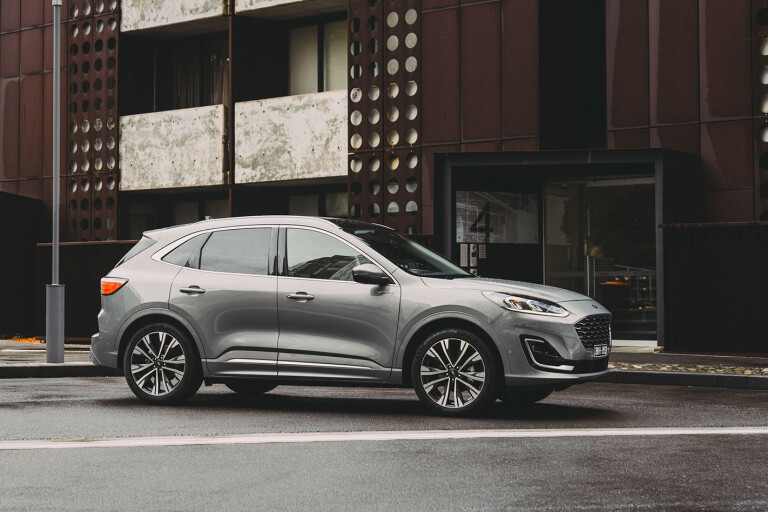
The Escape Vignale also has a certain spunk to it, which can’t really be said about similarly priced and powered top-spec medium SUV rivals such as the CX-5 Akera or Honda CR-V VT-LX.
Ford Escape Vignale AWD specifications
Body: 5-door, 5-seat SUV
Drive: AWD
Engine: 1999cc 4-cyl, 16v, turbo
Power: 183kW @ 5700rpm
Torque: 387Nm @ 3100rpm
Fuel consumption: 8.6L/100km (combined)
CO2 emissions: 199g/km
Compression ratio: 10:1
Weight: 1690kg
Transmission: 8-speed automatic
Suspension: MacPherson strut/Independent
L/W/H: 4629/11883/1680mm
Wheelbase: 2710mm
Tracks: 1597/1588mm
Brakes: Front ventilated discs (330mm / Rear discs (302mm)
Tyres: 225/55 R19 Continental Premium Contact6
Wheels: 7.5x18
Price: From $49,590
Score breakdown
Things we like
- Driveability
- Loads of equipment
- Slender looks
- Big boot
Not so much
- Busy ride over uneven surfaces
- Fuel consumption

COMMENTS